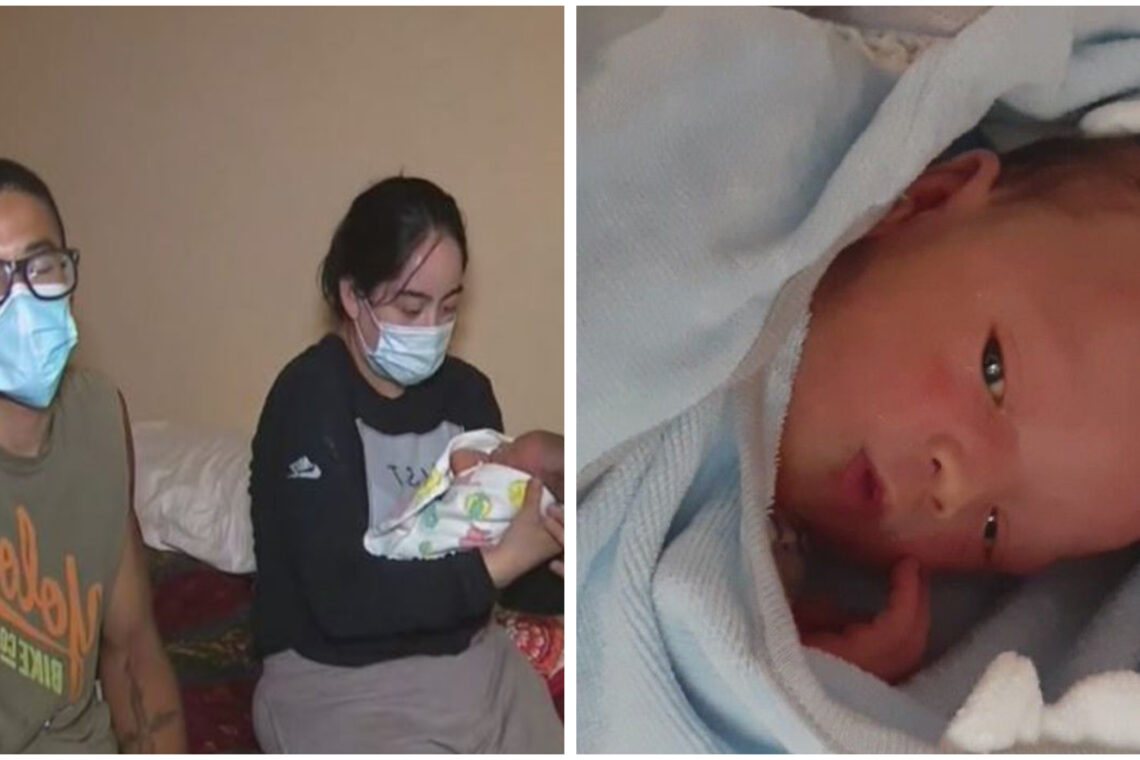
A United States Air Force veteran, Caleb Harris, found himself living on the streets alongside his pregnant wife, faced with challenges he could never have foreseen. But despite the overwhelming obstacles, he was able to perform an act of courage and resilience that may be one of his greatest accomplishments yet—he delivered his own child under extraordinary circumstances.
Harris was juggling multiple responsibilities before the pandemic struck. He was enrolled in college and worked at a furniture moving company to support his family. However, when COVID-19 disrupted daily life, his stability unraveled quickly. Without access to a laptop, he couldn’t keep up with his online courses, which ultimately cost him the educational benefits he was receiving under the GI Bill. This financial support had been essential to his education and livelihood, and without it, he could no longer afford his schooling. To make matters worse, his income from the moving company wasn’t enough to cover basic living expenses, and he and his wife soon found themselves without a place to call home.
As their situation grew increasingly dire, Harris and his wife resorted to living out of their car. They applied for Section 8 housing, hoping for relief, but the bureaucratic process stretched on for months, offering little hope. Day after day, they waited for a response, but there was no word from the housing authority. Despite their challenges, Harris stayed strong, doing everything he could to provide for his family.
As the weeks passed, his wife’s pregnancy progressed, each day bringing them closer to a significant milestone. Then, one weekend in the early hours of the morning, she went into labor. It was a sudden and intense moment, as she was only halfway through her eighth month of pregnancy, but the baby was coming, ready or not. She woke Harris up around 2 a.m., telling him her contractions had started. To add to the urgency, her water had already broken, and her placenta had started to separate, intensifying the urgency of the situation.
With no immediate access to a hospital and the baby on the way, Harris instinctively took control of the situation. He contacted paramedics, but he knew they might not arrive in time. So, despite the intensity of the moment and the gravity of their surroundings, he prepared to deliver the baby himself right there in their car. As he carefully followed instructions from the paramedics over the phone, a tiny arm suddenly extended, and a delicate hand reached out, grabbing onto his. In that moment, with a powerful display of resilience and bravery, Harris successfully delivered his own son, a beautiful baby boy, right there in the backseat of their car. His story of heroism and love underscores the strength he showed in bringing his child into the world against all odds.
Shortly after the delivery, the situation began to take a positive turn. The news of their circumstances reached local authorities, and Councilperson Nury Martinez became involved. Recognizing the immediate needs of Harris and his family, Martinez contacted the Los Angeles Homeless Services Authority (LAHSA), who then reached out to the Veterans Affairs office. Through the coordinated efforts of these agencies, they were able to provide immediate assistance to Harris and his wife. Before they were even discharged from the hospital, they had been arranged temporary housing in a motel room, offering them a much-needed respite after the difficult period they had endured.
For many people, navigating assistance programs can be a daunting and discouraging process, and it’s easy for some to fall through the cracks. As LAHSA officials explained, there are instances where applications get delayed or even overlooked, leaving individuals feeling stranded and without support. Fortunately, in Harris’s case, the combined efforts of local government and veteran support services provided him and his family a stepping stone toward a more stable future.
Harris’s journey speaks to the strength and resilience of veterans who often face tough reintegration challenges after their service. The story of this former airman, who was forced into homelessness and yet managed to bring his child into the world with his own hands, is both a reflection of his courage and a reminder of the support systems that can, and should, be there for veterans in need. The difficulties he and his wife endured highlight the struggles that many veterans experience as they seek housing and employment, often relying on programs that may not always deliver immediate assistance.
Their experience stands as an important call to action, urging communities and officials to recognize the unique challenges that veterans face and to continue building accessible pathways to housing, healthcare, and employment. Harris’s story, filled with both hardship and heroism, is a testament to the power of resilience in the face of adversity. His actions on that unforgettable night were nothing short of extraordinary, an example of a father’s love and a veteran’s determination.
Now, Harris and his wife can focus on their new chapter, welcoming their healthy newborn into a world they hope to build brighter and more stable for him. Although the road was filled with obstacles, his story serves as a powerful reminder that support, empathy, and action from communities can make a profound difference for those facing hardship.